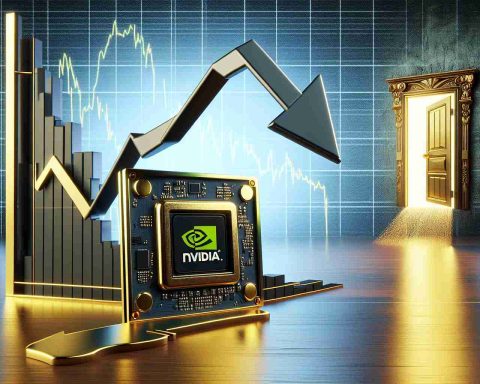- Nvidia’s CEO Jensen Huang predicts that practical quantum computing is potentially 15 to 20 years away, causing significant market upheaval.
- Rigetti Computing’s stock plunged 45% in a single day, reflecting investor concern over the delay in quantum advances.
- Market analysts cut Rigetti’s 12-month target to $5.20, hinting at a continued downturn.
- The quantum computing market is experiencing increased weekly volatility, now ranging from 22% to 35%.
- Despite challenges, the sector remains enticing due to its potential for groundbreaking innovations.
- Investors are advised to focus on companies’ fundamentals amidst market volatility.
Nvidia’s CEO Jensen Huang has thrown a curveball into the quantum computing industry with his recent revelation at CES 2025, warning that practical quantum computing might still be a distant dream, potentially 15 to 20 years away. This startling forecast ignited a massive sell-off in the market, plunging Rigetti Computing’s stock by a jaw-dropping 45% in a single day. Investors across the quantum sector are reeling from this anticipated delay, and the ripple effects are profound.
The shock waves didn’t spare others in the field; companies like IonQ also felt the sting of the market’s knee-jerk reaction. Although there was a slight recovery in after-hours trading, with Rigetti’s shares inching up to $10.33, skepticism looms large. Market analysts have cast a shadow on Rigetti’s prospects, lowering their 12-month target to just $5.20, signaling a potential drop of 49.1%.
The backdrop to this turmoil is a markedly volatile financial environment, where weekly fluctuations in quantum computing stocks have escalated from 22% to 35% within a year. Rigetti’s short interest ratio of 0.6, a mildly bearish signal, testifies to the traders’ unease in these turbulent times.
Amidst the uncertainty, the quantum computing sector’s dazzling allure still tempts with its promise of extraordinary breakthroughs. However, the industry stands at a critical juncture—one that advises investors to keep a keen eye on the fundamentals and operational strides of companies navigating these stormy waters.
As the quantum field grapples with both promise and peril, stakeholders are urged to tread with caution, balancing the high stakes of innovation against the harsh realities of market viability.
The Quantum Computing Conundrum: Why Nvidia’s Forecast Shakes the Industry
What are the implications of Nvidia’s CEO Jensen Huang’s statement on quantum computing?
Nvidia’s CEO Jensen Huang’s prediction that practical quantum computing may be 15 to 20 years away has sent shockwaves through the industry, revealing the pivotal disconnect between current technological capabilities and investor expectations. The immediate implications include:
– Market Volatility: Rigetti Computing experienced a 45% stock plunge, and there was a broader market sell-off affecting companies like IonQ. These short-term reactions showcase investor frustration and skepticism about early returns on quantum investments.
– Investor Caution: Analysts are now revising their financial forecasts, with Rigetti’s 12-month stock target dropping to $5.20. This advises investors to employ a cautious strategy, focusing on long-term fundamentals rather than speculative bursts.
– Innovation Reevaluation: Huang’s predictions prompt a reevaluation of innovation strategies within firms, encouraging a deeper focus on aligning technological advancements with realistic market developments.
For more about Nvidia and its products, visit nvidia.com.
How is the quantum computing sector evolving in response to these market conditions?
The quantum computing sector is adapting by:
– Strategic Partnerships: Firms are increasingly seeking collaborations with tech giants, hoping to leverage established infrastructures and resources to advance their capabilities.
– Focused Research: Companies are likely to allocate resources towards more immediate innovations, such as hybrid quantum-classical systems, to provide tangible outputs in the intermediate term.
– Diversification of Applications: Beyond traditional ambitions, quantum computing firms are exploring diverse fields such as quantum cryptography and simulation, offering new revenue streams and reducing dependency on a singular technology trajectory.
What are some potential future trends and predictions for quantum computing?
Several key trends and predictions are noteworthy:
– Incremental Advances: While full-fledged quantum computing may be distant, incremental advances are likely, particularly in error correction and qubit stability, which are critical for practical applications.
– Increased Regulation: As investments in quantum technologies grow, regulatory bodies across the globe may step in to ensure ethical standards and prevent market manipulations.
– Rise of Quantum Startups: Expect a surge in specialized startups focusing on niche areas within quantum technology, backed by venture capitalists looking to harness early innovation stages.
For more insights on emerging technologies, visit ionq.com.
Conclusion
While Nvidia’s CEO has painted a cautious picture of the near-term future, the quantum computing industry remains a field of immense potential. With careful navigation and realistic planning, the path to quantum supremacy holds promise albeit over a longer arc. Investors and stakeholders are encouraged to maintain a balanced view and focus on the fundamentals driving this technological frontier.





















